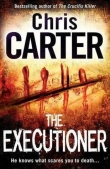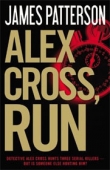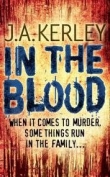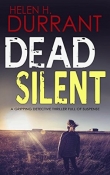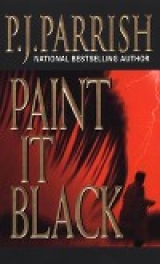
Текст книги "Paint It Black"
Автор книги: P. J. Parrish
Жанры:
Триллеры
,сообщить о нарушении
Текущая страница: 8 (всего у книги 20 страниц)
Chapter Nineteen
Louis hated reading in the car, but he forced himself to concentrate. He had nearly filled one spiral book with notes about the three dead men and now, as Wainwright’s cruiser zigzagged through the choked traffic on Cleveland Avenue, he tried to make some sense out of what he had written.
Friday. Today was Friday. Four days before he would strike again, if the pattern held true.
The last thing we have is time.
She was right.
He felt nauseated and closed the notebook. He looked over at Wainwright.
His jaw was set, almost clenched, and he hadn’t said much since Emily Farentino had walked out of his office. He didn’t need to say what Louis suspected, that he was embarrassed about the choice his friends at the bureau had made. Farentino was a rook. And she was female. Was Wainwright’s reputation worth no more than that?
“Dan,” Louis said softly.
Wainwright grunted.
“About Farentino . . .”
“What about her?”
“She must have something going for her for them to send her.”
Wainwright grunted again, this time more softly.
“At least they sent someone,” Louis said.
Wainwright glanced at him, then looked back at the road. “It’s a token offer of assistance, Louis. In the old days, a request from someone like me would’ve carried some weight.”
They stopped at a light. Louis watched a small plane take off from Page Field and lift quickly into the cloudless blue sky. It gave him a moment to work up the guts to ask the question that had been on his mind all morning.
“Dan, what division did you work?” Louis asked.
Wainwright didn’t look at him and didn’t answer until the light turned green and they started moving. “OPR,” he said. “Office of Professional Responsibility. Retired early on a medical.”
Louis stared out the window, lightly tapping his notebook on his knee. Office of Professional Responsibility? Man, he had thought Wainwright’s past was a colorful blaze of manhunts, priority investigations, and high-tech forensics. What was this OPR thing?
“We’re here. And so is she.”
Louis saw Emily Farentino waiting for them outside the medical examiner’s building. She was talking to a man in a suit whom Louis recognized as Driggs.
They climbed out and Farentino turned to watch them approach, pushing her glasses up her nose with her middle finger.
“Chief, this is—” Emily began, motioning to the suit.
“We know each other,” Wainwright mumbled, without looking at Driggs.
Driggs was staring at Louis. A wind gust off the nearby airstrip made his comb-over take sudden flight. When he saw Louis looking at it, he smoothed it down over his sunburned head.
“Let’s get this over with,” Wainwright said.
They followed him inside, down a tiled hall to the autopsy room. Louis trailed, watching Emily Farentino walk—strong, determined steps, a sense of purpose to her stride. She was still dragging that big briefcase but her small shoulders handled it well.
She had changed into jeans and a long-sleeved white shirt that Louis suspected might be a man’s. Her tiny ankles were pale and bare, her feet covered in black slip-on flats.
Odd uniform. Odd cop.
Octavius was at his station at the door and nodded silently as they approached. When he held the door for Emily, she thanked him.
“He’s the diener,” Louis said. “It’s German—”
“For servant. I know,” she said.
There was no sign of Vince Carissimi except the tape player on the counter. Louis could make out Lynyrd Skynyrd singing “That Smell.” He realized suddenly that the sickly sweet death smell that had surrounded Anthony Quick’s water-bloated corpse was absent this time. The room now smelled just vaguely musty, like a refrigerator that wasn’t quite clean. He looked at Emily Farentino. She didn’t seem fazed by it or anything in the room, including the body on the table.
Vince came in. “Welcome back, guys,” he said. His eyes immediately picked up Emily. “And you are . . . ?”
There was no sarcasm to his voice, Louis thought, just a hint of . . . what? Interest?
Emily motioned toward the badge hung on a chain around her neck. “Agent Farentino. FBI.”
“FBI? Well. Good to meet you. What office?”
“Miami.”
“Let’s get to it, Doc,” Wainwright said.
Vince drew his eyes off Farentino and went to the fiberglass table where the corpse lay, head slanting toward the stainless-steel sink. “No name yet for victim number three?” Vince asked.
Wainwright shook his head. “Got his description, prints, and that dog tattoo posted all across the Southeast. Nothing.”
Vince lifted the sheet covering the body from the feet, leaving the face covered.
“The man sorely neglected himself,” Vince said. “Don’t imagine he’d been to a doctor in years, didn’t bathe regularly. He had a scrape that had been infected for weeks.”
“Unless the infection killed him, I don’t think we care about that,” Driggs said.
Vince looked over at Driggs, then went on. “He’s about forty, maybe less, no drugs, but a BAC of point-two.”
“I don’t suppose that killed him either,” Driggs said. “Get to the point.”
Vince didn’t even give Driggs the courtesy of a look this time. He lifted the corpse’s hand. “He had motor oil on his palms and on his clothing. Might give you a starting point for a pickup. Unlike the last one, he had no defense wounds. And I was right. No sign of a shotgun wound this time.”
Driggs sighed loudly.
“Eighteen stab wounds in the chest cavity and shoulders, but here’s the kicker, my friends . . .”
Vince paused. “The wounds are different sizes,” he said. “At first I thought I was seeing two different knives, but upon closer inspection, I discovered the killer had broken his knife about halfway through his rage. Look.”
Vince pointed to a gaping split in the neck. “This was done with what was left of the knife. The wound depth is only three inches as opposed to up to twelve for the others. Those bruises were made from the butt hitting the skin.”
“He broke the knife and he just kept stabbing?” Louis asked.
“Apparently.”
Emily squeezed forward between Louis and Driggs. “Tell me we have the blade,” she said.
Vince turned and picked up an object wrapped in plastic. He opened it to reveal a thin, bloody blade, with an upward bow to its nine-inch length. “It was stuck in his spine. I believe the killer tried to retrieve it with his hand. I found massive injury to internal tissue that was inconsistent with knife wounds.”
Louis felt sick.
“You make the knife yet?” Wainwright asked.
Vince shook his head. “Not yet. But at least I’ve got the blade to send to the lab now. Ignotum per ignotius.”
“So he was stabbed to death,” Driggs said.
“Technically,” Vince said.
Vince lifted the sheet off the face. Louis tensed, feeling his stomach begin to swirl. Without the blood and seawater, the sunken face looked like a pile of week-old hamburger meat and mushy shredded wheat.
“The beating was postmortem, just like the others,” Vince went on. “And he was painted, as you can tell from the flecks still visible. Most of the paint washed away with the tide.”
“Same kind of paint?” Wainwright asked.
“Consistent with glossy black Krylon. He used satin on Mr. Quick.”
“At least that part of the pattern still holds,” Wainwright said.
“It didn’t match the boatyard paint?” Louis asked Vince.
“Nope. Definitely plain old Home Depot spray paint.”
“That still doesn’t eliminate Van Slate,” Wainwright said.
“Who’s Van Slate?” Driggs demanded.
Wainwright ignored him.
Driggs stepped forward. “Look, Wainwright, I don’t care if you bring in half of Quantico’s graduating class. If you’re holding out—”
“Could this wait, gentlemen?” Vince interrupted. “I moved this case to the top drawer for you boys and now I’ve got bodies stacked up like 747s at Newark. Let’s move on here.”
Driggs stepped back. Louis glanced at Farentino. She was staring at Driggs.
Vince cleared his throat. “Now, here’s something really interesting. I found nonhuman tissue in the chest wounds.”
“Nonhuman?” Wainwright asked. “Like what? Animal?”
“Don’t know yet. Give me a couple of days.”
Driggs scratched at his bald head. “So, what are you telling us? We got some kind of supernatural monster here?”
Vince smiled and Louis thought he detected a wink in Farentino’s direction. “I don’t speculate, Sergeant. That’s your job.”
Driggs slapped his notebook shut. “Send me your full report.” He headed for the door.
“Sergeant Driggs,” Farentino called out.
He turned impatiently. “What?”
“What kind of bullets you got in that gun?” she asked.
“Copper-jacketed hollow-points. Why?”
Farentino gave him a smile. “Maybe you should pick up some silver ones. And some garlic.”
Louis laughed. Driggs stared at Emily, then at Louis. He turned quickly and left.
Louis glanced at Wainwright. He wasn’t smiling. Wainwright’s radio went off and he turned away, moving out of earshot. Louis turned his attention back to Vince.
“You think the lab can match that knife to something in their catalogs?” he asked.
Vince shrugged. “It’s a really odd blade. I’m guessing foreign made. I’ll get you some photos of it so you can show it around on your end.”
“Kincaid.”
Louis turned to Wainwright.
“Some guy at the homeless shelter recognized the tattoo,” Wainwright said. “He says he doesn’t know who the man is, but he remembers seeing him hanging out at that soup kitchen on Fort Myers Beach.”
“The place run by The Saint?”
“Yeah. The guy says The Saint is there right now. But he says to hurry because he folds up his tent right after he’s done dishing out lunch.”
“I’m on my way,” Louis said, starting for the door.
“I’m going with you,” Emily said quickly.
Louis glanced at Wainwright. He couldn’t hide it. He looked glad to be rid of her.
Chapter Twenty
“I don’t think Driggs appreciated your comment,” Louis said.
“Do you think he even got it?” Emily said.
They were in a Sereno Key squad car, heading toward Fort Myers Beach. They passed the turnoff for the marina where Louis had questioned the jumbo shrimp woman, and then went up over the bridge and onto Fort Myers Beach. Louis had to slow the car to a crawl on congested Estero Boulevard.
“Sodom and Gomorrah,” Emily said, eyeing the crowds.
“Good place for The Saint,” Louis said.
The Blue Heron was a mom-and-pop hotel with fading pink stucco that spoke of a heyday sometime in the late fifties. It was sandwiched between a 7-Eleven and a new Taco Bell. Louis parked in the convenience store lot and he and Emily set out for the beach.
As they waited to cross the street, Louis looked south down Estero Boulevard. Barely visible in the glare of the sun was the familiar green sign of the Holiday Inn, the site of Anthony Quick’s abduction.
On the beach, they spotted The Saint’s operation immediately, a couple of old card tables set up under a palm. About twenty shabby men milled around, trying to find some shade as they quietly ate sandwiches and drank coffee from Styrofoam cups. There were two men manning the line and Louis zeroed in on the older one, a gaunt, deeply tanned man of about sixty, with a white beard, wearing shorts and a Tampa Bay Bucs T-shirt.
“Excuse me, are you The Saint?” Louis asked.
The man peered at him with milky blue eyes. “Nope.”
“You know where I can find him?”
“Nope.”
Louis stifled a sigh. Emily stepped forward. “We’re trying to find someone, and we were told he might have come here.” Emily paused. “You are The Saint, aren’t you?”
The man slapped a bologna sandwich on the plastic tray. “Look, we’re not hurting anybody here. Why can’t you cops just leave us alone?”
“We’re not—”
The old man turned away to hand a cup of coffee to a man who had trudged up beside Louis. “Hey, Willie, where you been? Ain’t seen you around.”
“Was up in Jersey for the summer. Took me a while to get back this time. Good to see ya, Saint,” the man said. He took his food and moved away.
The bearded man looked at Louis and extended his wrists. “Okay, take me in again. I don’t care. I’ll just find another place. This is public property. You can’t stop me from giving away food.”
“We’re not here to harass you,” Louis said. “We just need some help.”
The man stared at Louis and slowly let his arms fall. “Help,” he said with a snort. “Who doesn’t need help?”
“We’re trying to identify a man, a dead man, who might have been homeless,” Louis said. “Have you ever seen a man here with a tattoo on his left arm of a dog and the name Bosco?”
The Saint was staring at Emily now. “You really a cop, a little bitty thing like you?” he asked. He didn’t wait for her answer. He looked back at Louis.
“Bosco . . .” he said. “Yeah, I know that tattoo.” He paused and looked at some kids playing in the surf. “Shit. You say he’s dead?”
Louis nodded. He was glad when The Saint didn’t ask for details. “Was Bosco his last name?” Louis asked.
The Saint shrugged. “Who knows? Lots of folks here don’t use their real names. It’s like a family, I guess. We just call each other by whatever name fits, you know?”
“You called him Bosco?” Emily asked.
The Saint eyed her, still unsure he should reveal much more. “Nope. We called him Harry.”
“Do you know where he was from, where he lived?” Emily asked.
“Lived?” The Saint gave a small smile. “Well, you could try behind that 7-Eleven over there. Other than that, I don’t know much about him. He always showed up for his food here. I haven’t seen him in weeks now. I thought he just moved on. Or disappeared. Most do.” He glanced back out at the ocean.
Emily reached in her pocket and pulled out a card and pen. She scribbled a number on it. “If you think of anything else, call, okay?”
The Saint took the card and slipped it into his shorts pocket. “Sure, miss.”
“Thanks for your help,” Louis said. He paused, then reached into his pocket and pulled out some bills. When The Saint saw the two twenties, he shook his head.
“I don’t need it,” he said. He smiled. “I’ve got plenty of my own money. I spent my share of time on the street but my brother left me a bundle when he croaked. Asshole never called me when he was alive but then . . .” He gestured toward the sandwiches. “Sixty grand buys a lot of bologna.”
Louis and Emily left The Saint and trudged up the beach to the street. Louis waited while she emptied the sand from her shoes and they continued on to the 7-Eleven. The clerk had never heard the name Bosco or Harry and they had no photo to show her. But she said the management was constantly chasing away the homeless who slept behind the store near the Dumpster.
Behind the store, Louis and Emily discovered a heap of discarded boxes and dirty blankets, the remnants of a dismantled homeless camp.
“Lots of motor oil back here,” Emily said, nodding at the stained asphalt.
“Yeah. But whoever was here moved on,” Louis said. He kicked at an empty bottle of Mad Dog. “Let’s get out of here.”
They wound their way back through the tourists, toward the squad car. Louis climbed in and as soon as they were away from the crowd, he radioed in to Wainwright, telling him what little they had found. Wainwright’s response was clipped. Louis knew he was aware that Emily was listening.
“He doesn’t like me much, does he?” Emily said as they inched along in the traffic. She said it more as a statement than a question, but Louis sensed she wanted an answer.
“He was expecting the bureau to send an old friend,” Louis said.
“Malcolm Elliott retired a year ago,” Emily said. “They sent me instead.”
A tightness had crept into her voice. He wasn’t sure if it was defensiveness. Whatever it was, it made him uncomfortable.
“Look, Farentino,” he said, “Wainwright is kind of old school.”
“The good old boy network,” she said softly. “I know all about it.”
“Give him time.”
“I told you. We haven’t got time.”
She pulled her briefcase onto her lap and started rooting through it.
Louis stared at the cars inching along in the baking sun. He felt the need to say something conciliatory.
“So, how’d you come to work for the bureau?” he asked.
“I joined after getting my master’s degree at Stanford.”
“And before that?”
She leveled her eyes at him. “If you’re trying to find out if I was ever on the street, the answer is, no, I wasn’t.” She turned her attention back to the briefcase. “Except for the week they made us ride with the NYPD.”
Louis glanced at her. “I wasn’t—”
“Yes, you were,” she said quickly.
They crept along in silence. Emily rummaged furiously through the briefcase. She finally pulled out a file and tossed the briefcase to the floor with an impatient grunt. She started reading the file.
Louis kept silent. Great. Emily Farentino didn’t have any real experience. Wainwright was going to go nuts when he found out. He wasn’t exactly happy about it himself. Shit, he wasn’t happy about Wainwright retiring from some obscure division of the FBI, for God’s sake. He found himself wondering how long it would be before they were forced by public pressure to lateral the case over to the sheriff’s department. Wainwright would be back to busting shoplifters at the Sereno Key drugstore. And he himself would be on a plane back to Michigan.
He let out a sigh.
“What?” Emily asked.
“Nothing,” he said. They finally made it to the bridge. This was nuts. If he was going to have to work with this woman, he had to find a way to get through her armor.
“So, what division you work?” he asked.
“BSU.”
Louis glanced at her again.
“Behavioral Science Unit.”
“I don’t know—”
“Nobody does,” she said abruptly. She let out a sigh. “It’s new, the unit, and what we do. It’s . . . new.”
Louis tried to recall what little he had read about serial killers. He had read something about how police departments were starting to use psychologists as consultants. They were calling them “profilers,” the idea being they could figure out the twisted minds of criminals by poking around in the messes they left.
“So you’re what’s called a profiler?” Louis asked.
She looked surprised he knew the term. “I prefer ‘forensic psychologist.’ ”
“Ah. A shrink,” Louis said.
She shook her head. “I’m not a doctor.”
You’re not a cop, either, Louis thought.
They were up on the bridge now, heading back toward Fort Myers.
“Wainwright doesn’t know any of this,” Emily said finally. “Unless he’s checked.”
“He hasn’t checked,” Louis said. “You going to tell him?”
She took off her glasses and began to clean them on the tail of her shirt. “I heard things about Dan Wainwright before I came. I think he is—” She stopped herself. “There are some people who aren’t open to new ideas.”
Louis let a few moments pass in silence. For a moment, he considered asking her what the hell OPR was. But he didn’t want Wainwright to think he was checking up on him. He also didn’t want to do anything to make this case harder than it already was. Men were dying and he didn’t want to waste time playing referee between Farentino and Wainwright. They needed to get going in the same direction.
“Listen, Farentino,” he said finally, “if I’ve learned one thing it’s that you don’t get much by muscling your way into things. We’re outsiders here, both of us. Wainwright is in charge, at least for now. You ought to respect that.”
She lasered her eyes back to Louis. “And how many more bodies do we bury while showing this respect?”
Louis tensed, a quick knot forming in his belly. How many more men are you going to bury, Chief Gibralter?
Did she know? Had she checked him out? Did she know what had happened back in Michigan? She knew about Wainwright. She had all the resources in the world at her fingertips. She could easily have checked out his background. He would have done the same thing.
He inhaled thinly, determined not to let her rattle him. He stared hard at the road, slowly allowing himself to digest her remark differently. He had to appreciate her sense of urgency; he felt the same thing. He was seeing faceless black men in his dreams. He didn’t want to see any more real ones.
“Okay,” he said slowly. “So let me hear your theory.”
“About what?” she asked.
“About how this guy picks his victims.”
“I need to study the pattern first.”
“There is no pattern,” Louis said. “We thought there was, but he keeps changing. Except for the day he kills.”
“Tuesday,” Emily said.
She was quiet for a moment. “He has two needs,” she said finally. “He needs a place to live where he won’t stand out. But he needs a place to do his work that’s secluded.”
Louis thought her choice of the word “work” was odd.
“I’d say he lives near Fort Myers Beach,” Emily went on. “It’s crowded there, with lots of tourists and transients, and he would blend in. He wouldn’t live on Captiva or Sereno. The locals would know him. Also, serial killers tend to dispose of bodies away from where they themselves live.”
“So you think he stalked them?”
“It fits the usual pattern. He seems very impatient. I don’t think he stalks them for days on end. I think he zeroes in on them and then follows them until he feels the moment is good.”
“Well, what about Tatum then?”
“What about him?”
“We think his murder was pure impulse.”
Emily closed the file on her lap. “Why would you think that?”
“Tatum was different than the other two. Tatum’s car broke down. When Wainwright’s men found it, the hood was still up, so we’re guessing Tatum was stranded there for a while before the killer came along.”
“Came along,” she said. “Just came along, conveniently armed with his shotgun and can of spray paint.”
Louis glanced at her, glad the sunglasses hid his eyes. “So you think Tatum was followed, like the others?”
“Yes.”
“From where?”
“That’s what we need to find out.”
Louis turned on his blinker as he slowed at a corner. She was making sense. Shit. Wainwright was going to love this.
